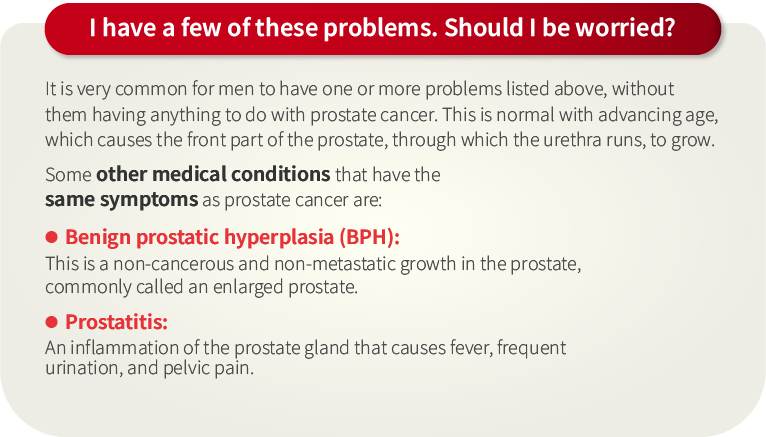What is the prostate and where is it located?
The prostate is a small walnut-shaped gland of the male reproductive system, located just below the bladder, surrounding the urethra. It produces fluid for semen that nourishes and protects sperm.
- Frequent urination- you may feel compelled to use the washroom more often during the day and night, which may even interrupt your sleep.
- Difficulty starting and stopping urination. Urinary retention, or the inability to empty the bladder, is also common.
- Significant decline in the strength of the stream of urine- you may find it difficult to maintain urine flow.
- Increasingly frequent urination, particularly at night.
- Inability to hold urine back. You may unintentionally pass urine.
- Ejaculation is painful. You may find it difficult to achieve an erection due to pain.
This stage marks the spreading of the cancer outside the prostate to nearby tissues. The symptoms are severe and cannot be ignored.
- Presence of blood in urine. Urine may look pink or red.
- Painful urination. This happens as the prostate enlarges due to cancer and presses on the urethra.
- Pelvic pain. There may be pain or a sensation in the hip and pelvic area due to the muscles being affected by cancer.
The symptoms at this stage are severe as the cancer has spread to other parts of the body.
- Pain in the bones of the hips, spine, and ribs due to metastatic cancer.
- Fatigue, tiredness, and unexpected loss of body weight.
If detected and treated early, prostate cancer is easier to cure. Talk to a urologist or your physician to discuss screening tests based on your age and health conditions. You can start the tests as early as 45 years of age.
- PSA Screening Test: The prostate-specific antigen blood test is the most commonly used screening test. It looks for PSA, a protein found in the blood in the prostate, the elevated levels of which could indicate prostate cancer. Other health reasons can also cause a high PSA. Hence, it is important to do other follow-up tests to confirm the diagnosis.
- Digital Rectal Exam: Due to its position adjacent to the rectum, the cancer of the prostate can be felt by a professional with a finger or device inserted through the rectum.
- Prostate Biopsy: Tissue samples taken from the prostate through transrectal ultrasound guidance are used to confirm or rule out cancer.
Prostate cancer is not a one-in-a-million disease. It is common, nevertheless, dangerous. Early detection and timely interventions take you ahead in the fight against the disease. Screening tests and proper follow-ups are mandatory to rule out or gauge the severity of the disease. This plays a crucial role in charting a treatment plan. Know your body, and know what is normal and abnormal. Do not hesitate if you observe any symptoms.












